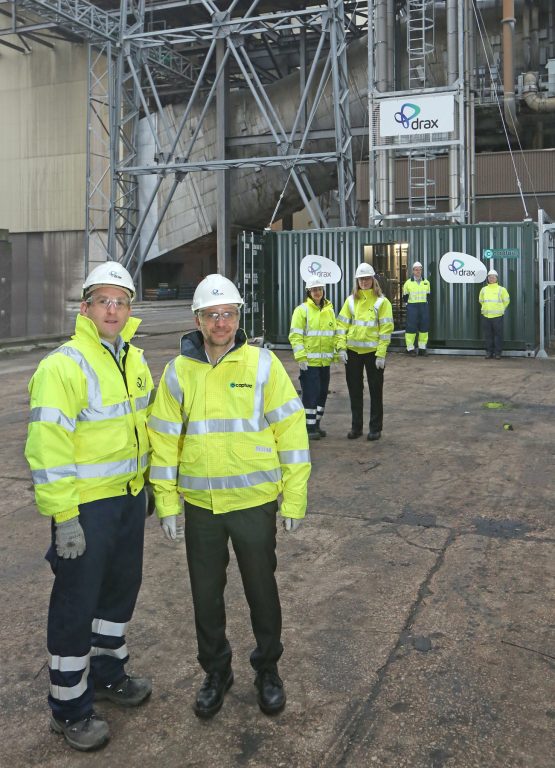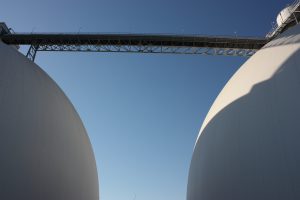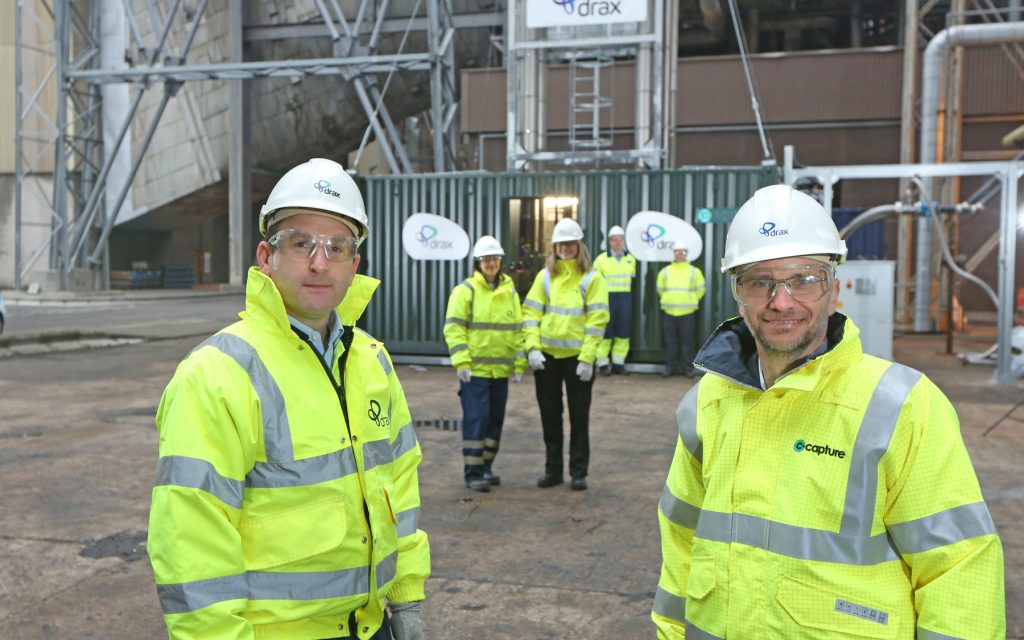-
Commissioning of the BECCS pilot plant at Drax Power Station will begin on Monday November 26 – the tenth anniversary of the Climate Change Act
-
It puts Britain at the forefront of the race to develop BECCS and could enable Drax to become the world’s first carbon negative power station
The commissioning of an innovative Bioenergy Carbon Capture and Storage (BECCS) pilot plant at Drax Power Station has started with the first carbon dioxide expected to be captured in the coming weeks.
If successful, the six month pilot project will capture a tonne of CO2 a day from the gases produced when renewable power is generated using biomass at Drax – the UK’s biggest power station, near Selby in North Yorkshire.
BECCS is vital to global efforts to combat climate change because the technology will mean the gases that cause global warning can be removed from the atmosphere at the same time as electricity is produced. This means power generation would start to reduce the carbon accumulating in the atmosphere – vital for tackling climate change.
Drax is partnering with Leeds-based C-Capture and is investing £400,000 in what could be the first of several pilot projects undertaken at the power station to deliver a rapid, lower cost demonstration of BECCS.
Drax Power Station became the largest decarbonisation project in Europe by upgrading two thirds of its generating units to use biomass instead of coal and, if the BECCS pilot is successful, it will examine options for a similar re-purposing of existing infrastructure to deliver more carbon savings.
The Royal Society and Royal Academy of Engineering have estimated that BECCS could enable us to capture 50 million tonnes of carbon dioxide per year by 2050 – approximately half the nation’s emissions target.
Will Gardiner, CEO, Drax Group, said:
“Our BECCS pilot project is the UK’s first step to delivering a key technology in the fight against climate change. If this project is successful, it could enable Drax to become the world’s first carbon negative power station – something many would never have dreamed possible a decade ago.
“Starting to commission the pilot plant on the tenth anniversary of the Climate Change Act demonstrates the progress made in decarbonising energy in the UK – but there is much more to do and this will be our focus at the Edinburgh CCS Summit later this week.
“At Drax we want to create a low carbon future – to do that we have to test the technologies that could allow us, as well as the UK and the world, to deliver negative emissions and start to reduce the amount of carbon dioxide in the atmosphere.”

L-R: Andy Koss Drax Power CEO, with Prof Chris Rayner, technical director, C-Capture Ltd (Foreground). Eva Penalver Garcia, Drax Group Research and Innovation Engineer and Rose McCarthy, C-Capture Chemist (middleground). Carl Clayton, Drax Research and Innovation engineer and the BECCS pilot project manager, with Caspar Schoolderman, Director of Engineering, C-Capture Ltd (background). Download high res photos here and here.
The government’s Clean Growth Strategy identified BECCS as one of several greenhouse gas removal technologies that could remove emissions from the atmosphere and help achieve long term decarbonisation.
Energy & Clean Growth Minister Claire Perry said:
“This major milestone in developing cutting-edge technology to reduce emissions while growing the economy shows our modern Industrial Strategy in action.
“Backed by government funded innovation, Drax has helped put the UK on the map when it comes to carbon capture ahead of pivotal talks with global leaders in Edinburgh this week, which aim to supercharge the global deployment of this game-changing technology.”
Over the summer work was undertaken to ensure the solvent C-Capture has developed is compatible with the biomass flue gas at Drax Power Station. This was completed successfully along with a lab-scale study into the feasibility of re-utilising the flue gas desulphurisation (FGD) absorbers at the power station.
FGD equipment is vital for reducing sulphur emissions from coal, but it is no longer required to control sulphur on four of the generating units at Drax that have been upgraded to use biomass, because the wood pellets used produce minimal levels of sulphur.
The C-Capture team has now proceeded to the second phase of the pilot, with the installation of a demonstration unit. Once commissioned it will isolate the carbon dioxide produced by the biomass combustion.
Chris Rayner, founder of C-Capture and Professor of Organic Chemistry at the University of Leeds, said:
“It’s clear that BECCS is one of a very limited number of viable negative emissions technologies, and is vital if we are to reach our CO2 emissions targets, not just in the UK, but around the World.”
“Being a key part of Europe’s first BECCS demonstration project is a great opportunity to showcase C-Capture’s technology, and through working with Drax, show how we can make a real impact on climate change.”
Caspar Schoolderman, Director of Engineering at C-Capture added:
“This is a very important milestone on the pathway to demonstrating and scaling up our exciting new technology. Working closely with the team from Drax has been a great experience, and we look forward to getting the demonstrator fully operational, and showing just how good our technology is.”
C-Capture is a spin-out from the Department of Chemistry at the University of Leeds, established through funding from IP Group Plc.
ENDS
Media contacts:
Ali Lewis
Drax Group Interim Head of Media and PR
E: [email protected]
T: 07712 670888
Jessica Gorton
Drax Group Press Officer
E: [email protected]
T: 07712 677177
Animation: https://vimeo.com/draxgroup/beccs
Editor’s Notes
- Drax Power Station is the single largest user of sustainable biomass for power in the world – around 70% of the electricity it produces is renewable, enough to power four million households.
- Biomass, such as sustainably sourced compressed wood pellets, is a renewable fuel – the CO2 captured when it grew is equal to the emissions it releases when used to generate electricity so it does not contribute new carbon to the biosphere. When coupled with CCS, the overall process of biomass electricity generation removes more CO2 from the atmosphere than it releases.
- The government’s Clean Growth Strategy identified ‘sustainable biomass power stations used in tandem with CCUS technology’ as a potential route to achieving long-term decarbonisation between now and 2050.
- Drax is in discussions with the British Beer and Pub Association to see if it could help keep the fizz in the drinks industry as part of its efforts to ensure the carbon captured during the BECCS pilot project is used in another process or industry.
- C-Capture is a spin out from the Chemistry Department at Leeds University and has attracted support from IP Group, the Department for Business Energy and Industrial Strategy’s Energy Entrepreneurs Fund and the CO2 Capture Project for CO2 capture technology, which has potential in a range of areas including biogas upgrading, natural gas sweetening and hydrogen production.
About Drax
Drax Group plc plays a vital role in helping change the way energy is generated, supplied and used. Its 2,300-strong staff operate across three principal areas of activity – electricity generation, electricity sales to business customers and compressed wood pellet production.
The Group includes:
Drax Power Ltd, which operates the largest power station in the UK, based at Selby, North Yorkshire and supplies seven per cent of the country’s electricity needs. The energy firm converted from burning coal to become a predominantly biomass-fueled electricity generator. Drax is the biggest renewable power generator in the UK and the largest decarbonisation project in Europe.
Haven Power, based in Ipswich, supplies electricity to large Industrial and Commercial sector businesses.
Opus Energy, based in Oxford, Northampton and Cardiff, provides electricity and gas to small and medium sized (SME) businesses.
Drax Biomass, is based in the US and manufactures compressed wood pellets produced from sustainably managed working forests, supplying fuel used by Drax Power Station in North Yorkshire to generate flexible, renewable power for the UK’s homes and businesses.
For more information visit www.drax.com/us
About C-Capture
C-Capture Ltd utilise their extensive knowledge of CO2 (carbon dioxide) based chemistry and engineering, to develop solvent systems for the removal of CO2 from gas streams with the potential to capture the CO2 in a form suitable for storage, and prevent it from entering the Earth’s atmosphere.
C-Capture‘s proprietary technology aims to remove or ‘scrub’ CO2 from large scale point sources of gas emissions. This is important for a broad range of commercially and environmentally relevant areas.
The low cost, high energy efficiency of C-Capture’s solvents help minimise the cost of CCS implementation and makes electricity generation with CCS a much more affordable, environmentally beneficial process.
C-Capture Ltd is a spin-out company from the Chemistry Department at the University of Leeds, and has attracted support from IP Group, the Department for Business, Energy and Industrial Strategy’s, Energy Entrepreneurs Fund, and the CO2 Capture Project, for development of CO2 capture technology, which has potential in a range of areas, including biogas upgrading, natural gas sweetening and hydrogen production. It was also the National Winner of Shell Springboard 2016, competition for low carbon businesses.
For more information visit www.c-capture.co.uk
About the University of Leeds
The University of Leeds has created more than 100 spin-out companies, with a market capitalisation in excess of £500 million. Seven of these spin-out companies are market listed on AIM, which is more than any other university in the UK. The University is also home to the EPSRC funded Centre for Doctoral Training in Bioenergy, and has extensive experience in energy research through the interdisciplinary Energy Leeds initiative.
The University is preparing to launch its £40m Nexus innovation and enterprise centre later this year. Nexus will provide business and industry with easy access to world-leading academic experts and their ground-breaking research, high quality facilities and cutting edge equipment at the University.
For more information visit www.leeds.ac.uk









